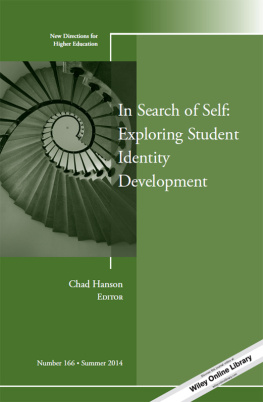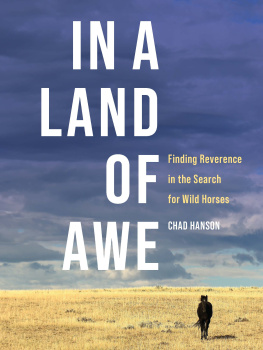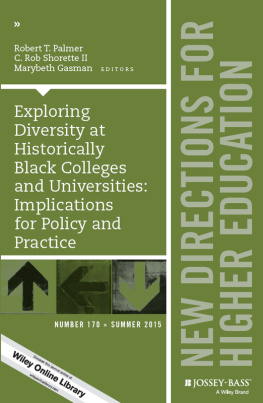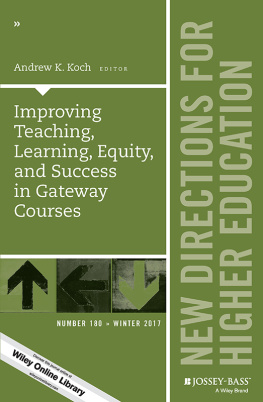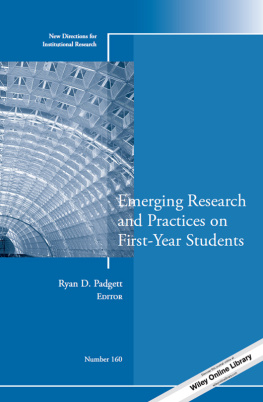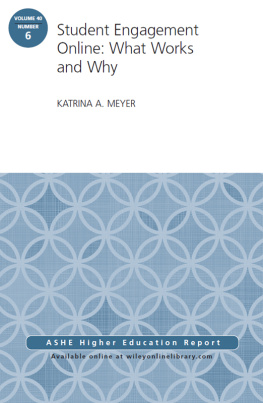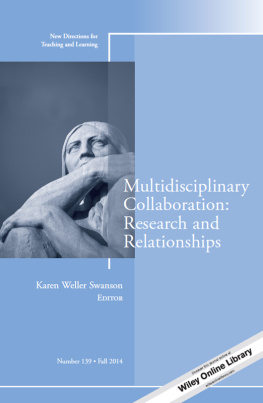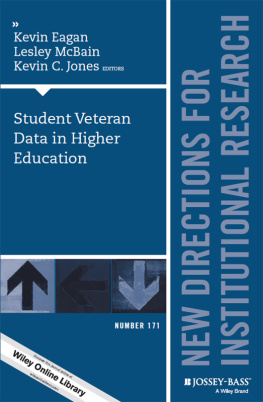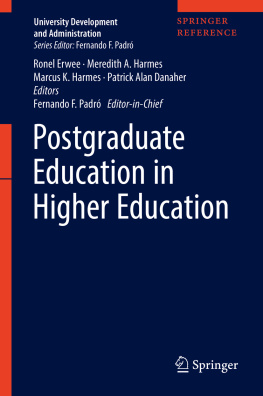
In Search of Self: Exploring Student Identity Development
Chad Hanson
New Directions for Higher Education, no. 166
Betsy O. Barefoot and Jillian L. Kinzie, Co-editors
Copyright 2014 Wiley Periodicals, Inc., A Wiley Company. All rights reserved. No part of this publication may be reproduced in any form or by any means, except as permitted under sections 107 and 108 of the 1976 United States Copyright Act, without either the prior written permission of the publisher or authorization through the Copyright Clearance Center, 222 Rosewood Drive, Danvers, MA 01923; (978) 750- 8400; fax (978) 646-8600. The copyright notice appearing at the bottom of the first page of a chapter in this journal indicates the copyright holder's consent that copies may be made for personal or internal use, or for personal or internal use of specific clients, on the condition that the copier pay for copying beyond that permitted by law. This consent does not extend to other kinds of copying, such as copying for general distribution, for advertising or promotional purposes, for creating collective works, or for resale. Such permission requests and other permission inquiries should be addressed to the Permissions Department, c/o John Wiley & Sons, Inc., 111 River Street, Hoboken, NJ 07030; (201) 748-6011; fax (201) 748-6008; www.wiley.com/go/permissions.
Microfilm copies of issues and articles are available in 16mm and 35mm, as well as microfiche in 105mm, through University Microfilms Inc., 300 North Zeeb Road, Ann Arbor, MI 48106-1346.
New Directions for Higher Education (ISSN 0271-0560, electronic ISSN 1536-0741) is part of The Jossey-Bass Higher and Adult Education Series and is published quarterly by Wiley Subscription Services, Inc., A Wiley Company, at Jossey-Bass, One Montgomery Street, Suite 1200, San Francisco, CA 94104-4594. Periodicals Postage Paid at San Francisco, California, and at additional mailing offices. POSTMASTER: Send address changes to New Directions for Higher Education, Jossey-Bass, One Montgomery Street, Suite 1200, San Francisco, CA 94104-4594.
New Directions for Higher Education is indexed in Current Index to Journals in Education (ERIC); Higher Education Abstracts.
Individual subscription rate (in USD): $89 per year US/Can/Mex, $113 rest of world; institutional subscription rate: $311 US, $351 Can/Mex, $385 rest of world. Single copy rate: $29. Electronic only--all regions: $89 individual, $311 institutional; Print & Electronic--US: $98 individual, $357 institutional; Print & Electronic--Canada/Mexico: $98 individual, $397 institutional; Print & Electronic--Rest of World: $122 individual, $431 institutional.
Editorial correspondence should be sent to the Co-editor, Betsy O. Barefoot, Gardner Institute, Box 72, Brevard, NC 28712.
Cover photograph Digital Vision
www.josseybass.com
Editor's Notes
All over the country, in the months of May and June, colleges conduct graduation ceremonies. At the end of the ritual, students move their tassels from one side of their mortarboard to the other. They toss their caps into the air. Then they rush to meet their relatives, as new and different people. In We're Losing Our Minds, Richard Hersh and Richard Keeling (2011) claim, At its root, the idea of higher learning is one of positive change: the student who graduates will not be, and should not be, the same person as the one who started college (p. 6). During a college education, we develop a new sense of who we are. The term graduate becomes a part of our identities.
In some ways, we all acknowledge the transformative purpose of attending a college or university. In the past 20 years, however, under pressure to document learning, many of us adopted the perspective and methods of 1950s behaviorism. We grew attached to the framework popularized by John B. Watson (1913) and B. F. Skinner (1964) in the early and middle parts of the 20th century. We often see teaching as a stimulus and learning as a response. Short-term, observable outcomes became the currency that we value. But even B. F. Skinner knew the limits of his views when applied to education. In an essay for the New Scientist, he wrote, Education is what survives when what has been learned has been forgotten (Skinner, 1964, p. 484). The development of skills and the acquisition of knowledge are important, but they are not the most crucial or lasting components of the college experience. Higher education, at its best, changes the lives of graduates. Thus, in The American College, Nevitt Sanford (1962) suggested, The proper study of the effects of college is the study of lives (p. 809). In spite of such advice, we often feel compelled to assess short-term, cognitive outcomes.
As an example, the American Sociological Association, the largest organization in my field, recently renamed its Section on Undergraduate Education. The group is now called the Section on Teaching and Learning. For those unfamiliar with the discipline of sociology, allow me to explain. When sociologists willingly shrink their research on a social institution down to one single pair of variables, something profound has taken place: a reduction in the scope of our work, a disregard for tradition, and from my perspective, a change for the worse. Sociologists formerly viewed education as a rich, complex, and meaningful process. For instance, it was a team of sociologists, led by Howard Becker, who suggested of medical education, Science and skill do not make a physician; one must also be initiated into the status of physician; to be accepted one must have learned to play the part of a physician in the drama of medicine (Becker, Geer, Hughes, & Strauss, 1961, p. 4).
In the past, sociologists attempted to understand the social roles, institutional norms, and cultural values at work in the production of life in schools. Today, in sociology and other fields, we tend to forgo our own perspectives and take up cognitive or behaviorist psychology when we turn our attention to students. The intent of this volume is to give a voice to scholars who use a range of means to conceive and study the process of becoming a college or university graduate.
Scope and Purpose
In what follows, educators and researchers in a variety of fields offer their views on how we might improve our efforts to understand the impact of higher education. In contrast to the current emphasis on psychometrics, the authors of the following chapters suggest methods that allow for a consideration of the personal changes that occur as students make progress toward the goal of becoming educated. Each contributor offers faculty, staff, and those who work in student development the means by which to explore how a college education affords students a chance to develop a new set of traits and characteristics.
Between the covers of this volume, you will find the perspectives and methods of sociologists, psychologists, an anthropologist, a political scientist, an occupational therapist, a community organizer, and higher education specialists. From their different disciplines, each contributor moves us in the direction of understanding the broad and long-ranging effects of becoming a college graduate.
Chapter Outline
In Chapter 1, I describe the cultural context that gives shape to our efforts when it comes to assessing students. I discuss the historical forces that moved staff and faculty members to focus narrowly on cognitive outcomes. I conclude by suggesting that the focus on learning has kept us from undertaking a broader assessment of the college experience.
In Chapter 2, Dan P. McAdams and Jennifer Guo raise a question that students ought to have an occasion to address, namely, How Shall I Live? McAdams and Guo offer the steps to conducting a narrative interview as a way to allow students to reflect upon the nature of the time they spend in college. They suggest that we should create a way for students to reflect upon the process of developing a meaningful life story. McAdams serves as director of the Foley Center for the Study of Lives, an organization that provides resources to those interested in the measures that individuals use to craft life stories out of their experience.
Next page
